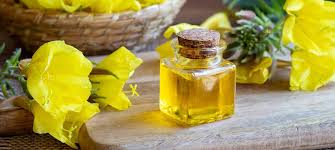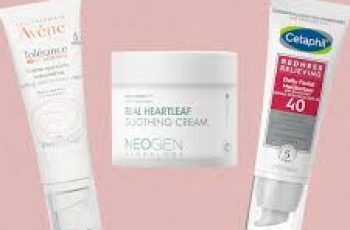
Evening Primrose Oil in Skin Care
Evening primrose oil, (Oenothera biennis), is a common ingredient in many skin care and supplement products.
It contains extremely high amounts of valuable fatty acids such as linoleic, linolenic, and gamma-linolenic fatty acids.
Many skin care products like moisturizers and cleansers contain this ingredient because linoleic acid is anti-inflammatory and soothing on skin.
Evening primrose oil is comedogenic, which means it can clog pores and should not be used on acne-prone skin or allergic sensitive skin subtypes.
What is evening primrose oil?
Evening primrose oil is a plant extract used in a variety of products like skin care products and fatty acid supplements.
EPO is considered the best source of gamma linolenic fatty acid out of all oils used in skin care.
EPO contains high concentrations of many useful fatty acids for products like moisturizers, cleansing creams, and various serums.
This oil is has shown significant positive impacts on patients with eczema.
Evening primrose oil is used in skincare because it has extremely high concentrations of anti-inflammatory compounds.
Linoleic and linolenic fatty acids are great in moisturizers and other products meant to soothe inflammation and hydrate skin.
EPO has one of the highest concentrations of linoleic acid of any oil used in skin care at 70%.
EPO fits into the ingredient category of “dry oils” because linoleic fatty acids are unsaturated fats.
It serves a similar function to sunflower oil products in skin care, but with a lower concentration of oleic acid than sunflower oil has.
Evening primrose oil products
Evening primrose oil has an extremely high concentration of beneficial and soothing unsaturated fatty acids for skin care, like linoleic, linolenic, and gamma-linoleic fatty acids,
It is used as an ingredient in many kinds of skin care products such as:
Evening primrose oil for skin lightening
Evening primrose oil is a tyrosinase inhibitor.
Tyrosinase inhibitors block tyrosinase receptors to stop them from producing melanin, or skin pigment.
Evening primrose oil is one of many skin lightening ingredients used in skin care.
It can be used alongside other tyrosinase inhibitors like hexylresorcinol, as well as PAR-2 blockers like niacinamide.
The best combination of skin care products for you depends on your custom skin care routine.
Shop for skin lighteners by your Baumann Skin Type to make sure you only use the right oils for your skin.
Take the Quiz
Retinoids
Using evening primrose oil with retinoids for wrinkles
Evening primrose oil will not fix wrinkles on skin on its own, but it can be used alongside a retinoid as part of an anti aging regimen.
Evening primrose oil is used alongside retinoids and other anti-aging ingredients in many products because of its soothing linoleic fatty acids which counteract the side effects of retinoids.
Retinoid routines vary greatly based on your skin type and personal skin issues. Be sure to take the Baumann Skin Type questionnaire to develop your custom skin care regimen!
Evening primrose oil in hair care products
Oils like with lots of unsaturated fatty acids like EPO are great for hydrating and repairing the proteins that make up our hair.
EPO is not particularly recommended as a hair care oil for acne-prone skin types because it can cause pimples along the hair line.
Hormones and evening primrose oil
Hormones and evening primrose oil
Evening primrose oil products can affect your hormones when taken orally.
When used in topical skin care products, EPO does not have any effect on hormone balance.
It contains extremely high levels of beneficial fatty acids that have been shown to have many interesting positive effects on hormone balance.
For example, evening primrose oil supplements have been shown to improve reproductive hormone regulation in obese rats. (1)
Though more testing is required, it seems that EPO might one day be commonly recommended for regulating reproductive hormonal imbalances related to obesity in humans.
EPO affected levels of follicle stimulating, luteinizing, and testosterone hormones, reducing the complications from hormonal changes in polycystic ovary syndrome. (2)
In this same study, EPO reduced insulin and serum glucose levels and increased insulin sensitivity – all of which are beneficial effects.
Metabolic processes having to do with the reproductive cycles were clearly improved as compared to the control group in this study.
Can you use evening primrose oil topically?
Yes, EPO oil can be used topically, and is found in many topical skin care products.
It is very anti-inflammatory because of its high linoleic acid concentration.
It also contains healthy omega-3 fatty acids, an important nutrient that is not naturally synthesized in the body.
Evening primrose oil is used in topical products to hydrate skin, repair the skin barrier, and soothe inflammation.
It is also an occlusive ingredient that helps hold water into the kin and protect the skin from allergens and irritants.
These are a few of our favorite topical EPO products:
Take the Quiz
Is Evening primrose oil safe?
Is evening primrose oil safe?
Evening primrose oil has an EWG score of “1,” the second best possible score after “verified.” This means that EPO is considered a very clean and safe oil.
That being said, one of the definitions of a clean oil is not having impacts on hormone production, regulation, or balance, which may not be true for EPO.
There are conflicting reports on the hormonal impacts of EPO, some studies have noted changes in pregnancy related hormones in obese rats when exposed to EPO through oral ingestion. (1)
When used in topical applications for skin care, EPO has shown no evidence of altering hormone production in any way.
It is worth asking an endocrinologist or your dermatologist if EPO is right for you if you are planning a pregnancy, are pregnant, or have hormonal imbalance.
Does evening primrose oil have any side effects?
EPO does not have any dangerous side effects when used in skin care products.
As with many oils in skin care, over application can lead to clogged pores or an undesirable film on the skin.
EPO is comedogenic, meaning it poses a risk of clogging pores in acne prone or sensitive skin subtypes.
Just like any plant-based ingredient, an allergy to EPO is possible, though unlikely.
Consult your custom skin care regimen to find out how often EPO products can be used on your skin.
Evening primrose oil for specific conditions
Evening Primrose oil for Specific Skin Conditions
Because of its myriad benefits in skin care, there are a number of skin conditions that can be treated with products containing evening primrose oil such as:
eczema
inflammation
psoriasis
rosacea
It is not recommended for all conditions or skin types because it is comedogenic, meaning it can clog pores.
EPO may not be right for your Baumann Skin Type so look for your skin type octagon on products when you shop for skin care containing evening primrose oil to see if the products is right for you.
Take the Quiz
Evening primrose oil for acne
EPO is a comedogenic ingredient, meaning it can easily clog the pores of some sensitive skin types.
When using EPO with acne or otherwise oily skin, make sure to closely follow your custom skin care regimen.
Using EPO outside of your recommended regimen may result in clogged pores or excessive moisture on the skin, which can lead to a change in the skin’s microbiome.
There are many different types of treatment routines for acne, which include non-comedogenic moisturizers.
How often should I use evening primrose oil?
How often should I use evening primrose oil?
Depending on your skin type, you might be able to use EPO multiple times per week, or even daily.
Since EPO is comedogenic, some sensitive skin subtypes might want to avoid using it regularly.
Consult your dermatologist or take the Baumann Skin Type Questionnaire to see if EPO is right for you!
Take the Quiz
Can you use products with evening primrose oil while pregnant?
It has been proposed by midwives for generations that use of EPO speeds up gestation, but no studies corroborate this belief. In fact, multiple studies found that this claim was untrue. (3,4)
It seems that EPO has no effect on pregnancy in general, particularly on the length of pregnancy.
EPO might be useful regulating hormones required for healthy normal gestation in obese populations
Some sources claim that EPO should be altogether avoided during pregnancy, so consult your OB/GYN if you have any concerns. (5)
There are other ingredients in the skin lightening category that are recommended for conditions like melasma during pregnancy.


